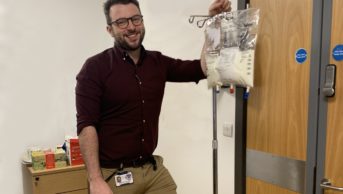
College of Medicine / Andrew Johnson
Healthcare professionals, including pharmacists, are failing to give patients evidence-based dietary advice that could improve their health because they lack the training to do so, a conference has heard.
Delegates at the ‘Food. The Forgotten Medicine’ conference, held at the Royal Society of Medicine in central London on 9 June 2016, were told that patients are increasingly seeking advice on diet and nutrition to treat specific conditions and maintain overall good health, but many healthcare professionals lack the basic expertise to recommend dietary strategies to their patients.
Broadcaster and GP Phil Hammond deemed this lack of nutrition training as “clinically negligent”, while nutrition and health expert Andrew Weil from the University of Arizona called for an integrated medicine approach that included nutrition.
‘‘Half of prescribed medicines could be replaced with dietary advice. [It] is more cost effective, safe and has no negative side effect,’’ he argued.
Delegates at the multidisciplinary healthcare conference, which was convened by independent health charity the College of Medicine, heard examples of where dietary interventions have impacted positively on particular diseases, such as type 2 diabetes and cardiovascular disease.
Marie Polley, senior lecturer in health sciences at the University of Westminster, who evaluated a health adviser intervention project conducted in Cullompton, Devon, said that type 2 diabetes should no longer be considered a life-long disease because in many cases it can be reversed with dietary advice. “The NHS considers [type 2 diabetes] a disease for life, so psychologically it’s not helping [patients],’’ she said.
She went on to explain how results from the project in Devon suggest that dietary consultations (four 30-minute appointments over a three-month period) to patients who had just been diagnosed with diabetes or pre-diabetes improved their HbA1c levels and saw a reduction in healthcare costs.
Meanwhile, Ali Khavandi, consultant interventional cardiologist, Royal United Hospital Bath NHS Foundation Trust, said 80% of cardiovascular disease could be prevented by diet and lifestyle but added that few medical consultants focus on this with their patients.
He said that healthy eating advice that focuses on the ‘Eatwell Guide’, a tool used in the UK to define government recommendations on how much of what we eat overall should come from each food group to achieve a healthy, balanced diet, is ‘‘wrong, outdated and disempowers us in healthcare’’.
Duncan Selbie, chief executive of Public Health England, told delegates that he also wanted food to become a priority issue in the UK.
Speakers at the conference concluded that more evidence-based nutrition training is required to give healthcare professionals the skills and expertise to help patients.
The College of Medicine is currently drafting a consensus statement for the role of healthcare professionals in nutrition. The statement will acknowledge: that healthcare professionals do not know enough about nutrition; that encouraging healthy eating and good nutrition lends itself to a patient centric self-care model; and that the public is seeking guidance from clinicians to make wise, evidence-based and safe choices.


